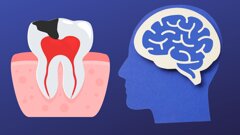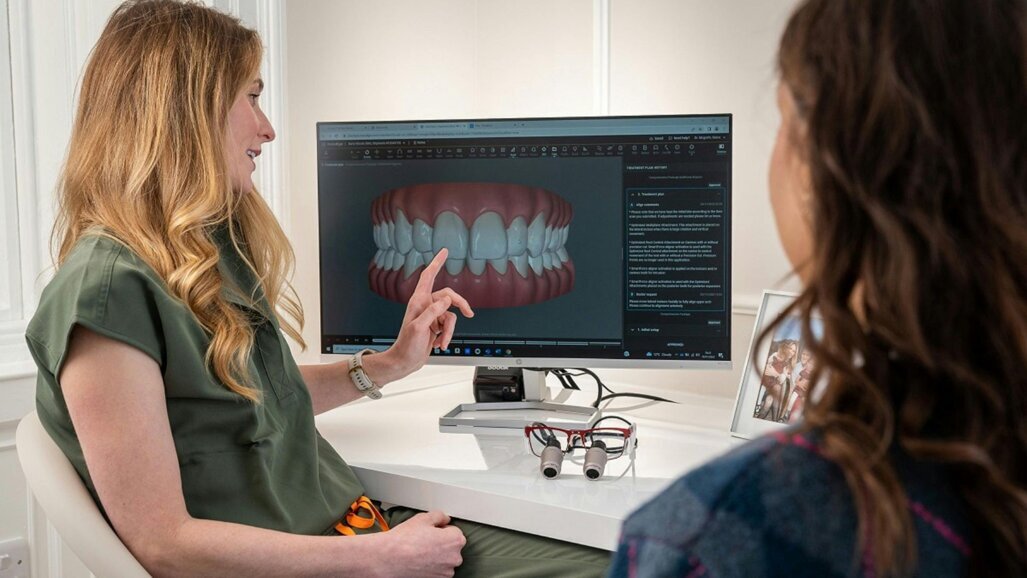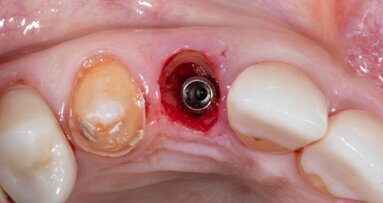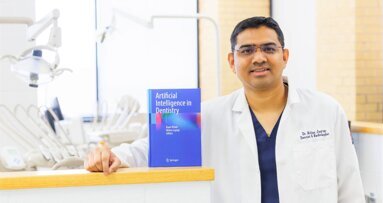Leuven, Belgium: As digital dentistry continues to evolve, artificial intelligence (AI) is stepping into roles once thought to require exclusively human expertise. A new preclinical study, published in Clinical Oral Implants Research, has demonstrated that AI can successfully plan virtual dental implant placements with a level of accuracy, efficiency, and consistency comparable to that of experienced clinicians.
The research, led by Dr Bahaaeldeen Elgarba and colleagues from KU Leuven, compared the performance of an AI-based implant planning tool with that of human clinicians (Human Intelligence—HI) in cases of single missing posterior mandibular teeth. The study evaluated 50 cases using CBCT and intraoral scans. <sup>1</sup>
High accuracy and expert-level planning
The findings revealed that 89% of AI-generated implant plans were clinically acceptable, closely matching the 93% acceptability rate of human-generated plans. The AI tool was able to select implant dimensions—length and diameter—that were remarkably similar to those chosen by expert clinicians.
“This study demonstrates that AI is not just a theoretical possibility but a practical tool that can achieve near-expert accuracy in implant planning,” the authors noted.
Significant time savings and consistency
One of the most striking outcomes was the AI system’s time efficiency. On average, AI completed virtual implant planning in just 187 seconds, less than half the time taken by human experts (406 seconds). Additionally, the AI provided 100% consistency, generating identical plans every time it was used with the same patient data. In contrast, human planning showed natural variability between and within operators.
AI demonstrates accuracy, speed, and consistency in virtual implant placement, producing clinically acceptable plans that are comparable to those of human experts.
Can experts tell the difference?
To further validate the AI’s performance, the study employed a Turing test, in which experienced implant dentistry specialists were asked to distinguish between AI-generated and human-generated plans. Interestingly, experts were unable to correctly identify the AI-generated plans in 58% of cases, underscoring how closely the AI system mimicked human decision-making.
Clinical relevance and future outlook
The authors concluded that AI could serve as a valuable support tool in dental implantology, offering faster and highly consistent virtual planning without compromising clinical acceptability. This could be particularly beneficial in general practice settings or for less experienced clinicians.
However, the researchers emphasised that further clinical trials are needed to validate AI performance in more complex cases and real-world settings. The study was limited to cases involving single missing posterior teeth with sufficient bone volume and high-quality imaging.
As AI continues to advance, its integration into the digital workflow may redefine the future of implant planning, allowing clinicians to focus more on patient care while maintaining high standards of precision and predictability.
Reference:
1. Elgarba, B.M., Fontenele, R.C., Du, X., Mureșanu, S., Tarce, M., Meeus, J. and Jacobs, R. (2025), Artificial Intelligence Versus Human Intelligence in Presurgical Implant Planning: A Preclinical Validation. Clin Oral Impl Res, 36: 835-845. https://doi.org/10.1111/clr.14429
Topics:
Tags:
Embarking on a pioneering journey, a new artificial intelligence (AI)-driven bibliometric analysis 1 has unveiled the scientific landscape of the Socket ...
Dr. Rohan Jagtap—the author of the book “Artificial Intelligence in Dentistry”—was interviewed by Dr. Amisha Parekh, PhD candidate at the University...
The AI Index is recognised globally as one of the most credible and authoritative sources for data and insights on artificial intelligence (AI). The AI ...
Dentistry is witnessing the combination of Artificial Intelligence (AI) and Augmented Reality (AR), two disruptive technologies that promise to ...
Dr. Jason Griggs, Associate Dean of Research, School of Dentistry, University of Mississippi Medical Center, who was recently awarded the prestigious Wilmer...
Since its inception, dentistry has progressed beyond traditional approaches to embrace innovative technologies that improve accuracy, efficiency, and ...
Artificial intelligence (AI) and machine learning (ML) have emerged as powerful tools for improving diagnosis, treatment planning, and patient monitoring in...
Artificial intelligence (AI) has emerged as a game changer in various industries, and oral healthcare is no exception. In recent years, AI has been ...
Technology is now pervasive in dentistry, and implantology is no exception. Intra-oral and face scanners, CBCT and digital condylographs allow us to acquire...
Live webinar
Tue. 24 February 2026
11:30 pm IST (New Delhi)
Prof. Dr. Markus B. Hürzeler
Live webinar
Wed. 25 February 2026
1:30 am IST (New Delhi)
Prof. Dr. Marcel A. Wainwright DDS, PhD
Live webinar
Wed. 25 February 2026
9:30 pm IST (New Delhi)
Prof. Dr. Daniel Edelhoff
Live webinar
Wed. 25 February 2026
11:30 pm IST (New Delhi)
Live webinar
Thu. 26 February 2026
6:30 am IST (New Delhi)
Live webinar
Tue. 3 March 2026
9:30 pm IST (New Delhi)
Dr. Omar Lugo Cirujano Maxilofacial
Live webinar
Wed. 4 March 2026
6:30 am IST (New Delhi)
Dr. Vasiliki Maseli DDS, MS, EdM



 Austria / Österreich
Austria / Österreich
 Bosnia and Herzegovina / Босна и Херцеговина
Bosnia and Herzegovina / Босна и Херцеговина
 Bulgaria / България
Bulgaria / България
 Croatia / Hrvatska
Croatia / Hrvatska
 Czech Republic & Slovakia / Česká republika & Slovensko
Czech Republic & Slovakia / Česká republika & Slovensko
 France / France
France / France
 Germany / Deutschland
Germany / Deutschland
 Greece / ΕΛΛΑΔΑ
Greece / ΕΛΛΑΔΑ
 Hungary / Hungary
Hungary / Hungary
 Italy / Italia
Italy / Italia
 Netherlands / Nederland
Netherlands / Nederland
 Nordic / Nordic
Nordic / Nordic
 Poland / Polska
Poland / Polska
 Portugal / Portugal
Portugal / Portugal
 Romania & Moldova / România & Moldova
Romania & Moldova / România & Moldova
 Slovenia / Slovenija
Slovenia / Slovenija
 Serbia & Montenegro / Србија и Црна Гора
Serbia & Montenegro / Србија и Црна Гора
 Spain / España
Spain / España
 Switzerland / Schweiz
Switzerland / Schweiz
 Turkey / Türkiye
Turkey / Türkiye
 UK & Ireland / UK & Ireland
UK & Ireland / UK & Ireland
 International / International
International / International
 Brazil / Brasil
Brazil / Brasil
 Canada / Canada
Canada / Canada
 Latin America / Latinoamérica
Latin America / Latinoamérica
 USA / USA
USA / USA
 China / 中国
China / 中国
 Pakistan / Pākistān
Pakistan / Pākistān
 Vietnam / Việt Nam
Vietnam / Việt Nam
 ASEAN / ASEAN
ASEAN / ASEAN
 Israel / מְדִינַת יִשְׂרָאֵל
Israel / מְדִינַת יִשְׂרָאֵל
 Algeria, Morocco & Tunisia / الجزائر والمغرب وتونس
Algeria, Morocco & Tunisia / الجزائر والمغرب وتونس
 Middle East / Middle East
Middle East / Middle East
























































To post a reply please login or register